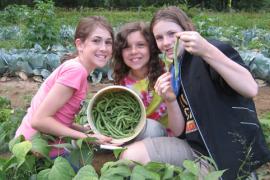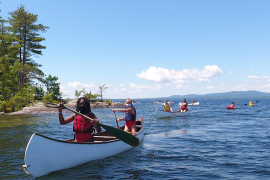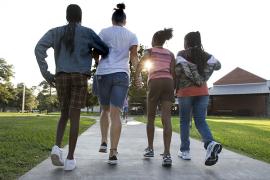At camp, the types of recreational activities people participate in are undoubtedly fundamental to their experience — serving as opportunities for them to gain insights they may carry with them for the rest of their lives. Among those activities, Hawaiian or luau-themed social events are common.
No doubt the donning of Hawaiian wear and plastic flower leis, playing of Hawaiian music, and dancing and eating by torchlight on the beach or in another outdoor location is a familiar sight for many. Some may even have very positive memories associated with such Hawaiian and luau-themed festivities. And many likely perceive these events to be harmless — a mere means to have fun and create memories while appreciating the great outdoors.
Although it may be understandable to think so because these themed merriments have become so normalized and are indeed staples at many camps, don’t be misled. These Hawaiian or luau-themed activities are detrimental to the way people view Native Hawaiians and Hawaii (Hawaiʻi to Native Hawaiians) as a whole.
With the camp community being a substantial source of influence and education for younger generations (and for the sake of providing Native Hawaiians with the respect and empowerment they deserve), it is crucial that camp professionals understand why such behaviors with regard to Hawaiian culture are problematic.
What is most apparent is that such themes egregiously suggest that Hawaiian culture is merely a source of entertainment and consumption. Most participants of these Hawaiian or luau-themed events emulate actual Hawaiian customs and practices (such as dancing hula), disregarding the cultural significance behind them. A luau (lūʻau, in Hawaiian) by custom isn’t just a regular paʻina (party) or social event. Native Hawaiian author Anne Keala Kelly said luau were often substantial, all-day affairs for royalty or chiefs and were reserved for significant occasions (Lloyd, 2014). Nowadays, Native Hawaiians generally uphold similar standards for luau, centering them on important milestones such as a baby’s first year of living, graduations, weddings, and so on.
Rather than being respected as traditions that are meant for specific and important occasions, participation of non-Native people in festivities that misappropriate Hawaiian cultural practices degrades and disregards the significance of these rituals, turning them into symbols of a “fun and amusing party theme.”
With that said, there are even deeper implications regarding these Hawaiian and luau-themed events and the hurt they cause Native Hawaiians. Such parties essentially uphold a problematic history of America regarding Hawaii as nothing more than a vacation destination — a “paradise” for outsiders to escape to. Such marketing has constructed an exoticized and romanticized version of Hawaii that people continue to believe in. Products like luau kits and non-Native Hawaiian controlled commercial luau events have existed to entice people to either visit the Islands or partake in its “cultural spectacles” at home (Miller-Davenport, 2017) — dismissing the existence of actual Native Hawaiian people, history, and culture for the sake of people’s pleasure. Additionally, it has undoubtedly contributed to the overtourism affliction that has affected the quality of life in the Islands, especially for Native Hawaiians.
Being respectful of Native Hawaiians and their culture and traditions by eliminating luau and Hawaiian themes at camp does not mean camps can’t hold regular beach parties and other entertaining outdoor events. Plenty of fun and insight-inducing moments can be had without attaching Hawaiian cultural components to camp events.
References
- Lloyd, O. (2014, December 20). Consuming Hawaiʻi: Anne Keala Kelly on the appropriation of Hawaiian culture. Deep Green Resistance News Service. dgrnewsservice.org/civilization/colonialism/consuming-hawai%ca%bbi-anne-keala-kelly-appropriation-hawaiian-culture/
- Miller-Davenport, S. (2017). A ‘Montage Of Minorities’: Hawai‘i Tourism And The Commodification Of Racial Tolerance, 1959–1978. The Historical Journal, 60(3), 817–842. https://doi.org/10.1017/S0018246x16000364
Born and raised on the North Shore of Oahu, Hawaii, Gisele Bisch currently writes as an opinion columnist for The Daily Princetonian. As a Native Hawaiian, her work largely covers Native Hawaiian and other Indigenous issues. When not writing, Gisele is a full-time student at Princeton University, where she intends to major in sociocultural anthropology with a minor in journalism.
Photo courtesy of YMCA Camp Sea Gull and YMCA Camp Seafarer, Arapahoe, NC.



